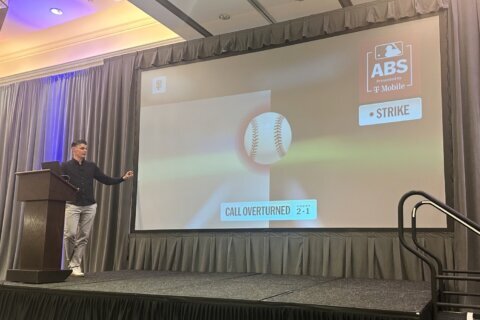Throughout February, WTOP is celebrating Black History Month. Join us on air and online as we bring you the stories, people and places that make up our diverse community.
This video is no longer available.
We all know Jackie Robinson and how he broke baseball’s color barrier with the Brooklyn Dodgers in 1947. But there’s another pioneer whose career began in D.C. that’s worth remembering.
“Emmett Ashford worked in the minor leagues for several years hoping he would get his shot in the Major Leagues,” longtime D.C. sportscasting legend Johnny Holliday told WTOP.
Holliday got to know Ashford during the last years of the old Washington Senators when Holliday was doing the team’s radio broadcasts before the club moved to Arlington, Texas, and became the Texas Rangers.
“I did the pregame show. I’d interview Ted Williams, the Senators’ manager at the time, and many of the players. We would sometimes interview the umpires, so I got to interview Ashford,” Holliday said.
Ashford had worked on the West Coast in the Pacific Coast League for 12 seasons after serving in the Navy in World War II and later working with the U.S. Postal Service, where he was a local amateur sports official, working three sports — baseball, basketball and football — before making it into professional baseball in the early 1950s.
Ashford’s climb to the top tier of professional baseball was slow. His promotion to the American League came 19 years after Robinson made the journey to Brooklyn. At 51, he was the oldest rookie umpire in MLB history.
In late 1965, Ashford learned he would become the first African American Major League Baseball umpire, and he worked his first American League game in D.C., on Opening Day, April 11, 1966, as the Senators hosted Cleveland.
On game day, at then-D.C. Stadium, Ashford almost didn’t get into the park. With Vice President Hubert Humphrey and other VIPs in attendance, the stadium was surrounded by police. Secret Service agents stopped Ashford in the tunnel going to the umpire’s room under the grandstands. The agents didn’t believe Ashford was an umpire.
According to MLB.com, the agents said, “There are no Negro umpires in the major leagues.” Ashford recalled he responded by saying, “Well, there will be a Negro umpire in the American League if you will let me into the park.” Ashford was finally admitted after police checked his credentials.
During the game, which Cleveland won 5-to-2, as the junior man on the crew Ashford worked third base and made only one routine call, ruling a Frank Howard home run ball fair, when it hit the screen in left field. Three days later, after rotating around the infield he would call his first AL game behind the plate.
American League president Joe Cronin, who hired Ashford, said to him after the game, “Emmett, today you made history. I’m proud of you.”
Ashford expressed his gratitude to Cronin, commenting, “He bucked certain odds to give me the chance. Somebody had to break in, and I’m proud it’s me.”
The other umpires autographed a game ball and presented it to their new rookie crew member.
While he never compared himself to Robinson, Ashford said Robinson’s story inspired him to follow his dream to umpire at the professional level and eventually make it to MLB.
Even before he had made it to the American League, Ashford had developed a reputation for being more demonstrative than other umpires. He sprinted to his position on the field, his dark uniform was always crisply pressed, his shoes were brightly polished, and he wore cuff links on uniform shirts.
When the questions about his penchant for showmanship came up, he answered: “Look, I just love umpiring. I think it’s the greatest thing in the world. I can’t do anything halfway. I guess I’m just so full of enthusiasm that it comes out of me that way.”
Johnny Holliday said Ashford’s high level work ethnic was something special.
“Emmert Ashford took a lot of pride in being on top of the play and hustling on the play. The fans loved him,” Holliday said. “He had a high-pitched voice and was very emphatic when he called balls and strikes. You could hear him in the last row of the upper deck.”
In the 1960s and 1970s, baseball had a mandatory retirement age of 55 for umpires. Ashford came off the field at age 56 after being given a one-year extension to qualify for a pension. During his career, Ashford worked 805 regular season games, including the 1967 All-Star Game and the 1970 World Series. He then joined baseball as a special assistant to the commissioner and was the supervisor of officials for a college summer baseball program.
“It was obvious to me why every Major League ballplayer and manager liked and respected him. He was tough, but he carried a very powerful personality,” Holliday said. “He was an excellent umpire.”
In 1980, Emmett Ashford died of a heart attack at age 65. While he was not inducted into the Baseball Hall of Fame like his hero Jackie Robinson was, Ashford is not far away. He is buried a few miles from the baseball shrine at historic Lakewood Cemetery in Cooperstown, New York.
Get breaking news and daily headlines delivered to your email inbox by signing up here.
© 2024 WTOP. All Rights Reserved. This website is not intended for users located within the European Economic Area.








